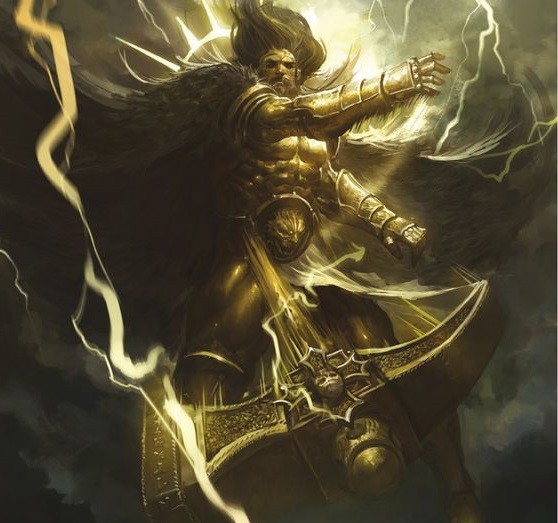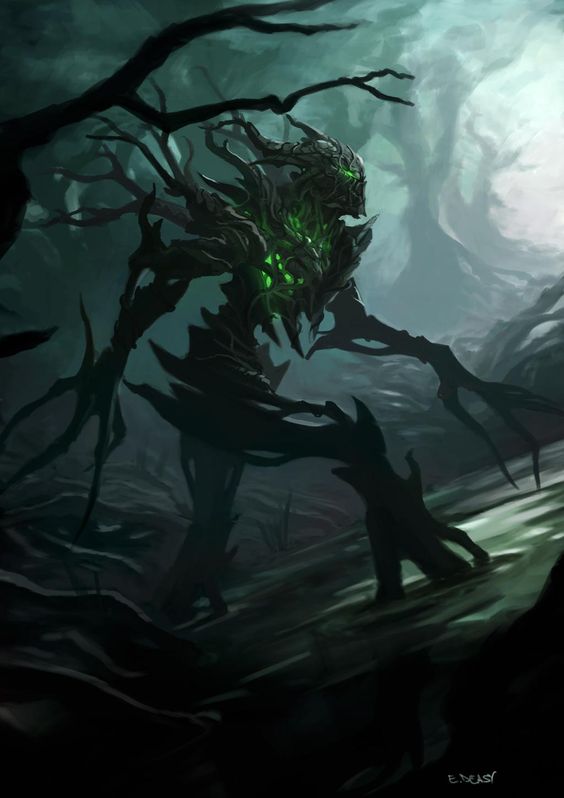**Player Note** Deities play an important part in the world and lives of the NPCs, but they can also play a large role for the players as well. First and foremost, there is no requirement for your character to dedicate him or herself to a God. Perhaps instead they ignore the Gods, feeling that they are self-serving and have left people to their own devices; or perhaps instead they do worship but don't focus on any one particular god.
If you do end up becoming a follower of a particular deity, it does come with its own benefits and drawbacks. In time, as you interact with your god, you may gain additional benefits/buffs/spells and quest opportunities relating to your deity. But, you will be expected to role play in a way that supports the ideals of your selected deity. If you regularly take action that go against tenets of your deity may result in a loss of favour, and at the most extreme end, even the loss of power or punishment. Selecting a deity can be a great way to add flavor to your background, and give you a simple mechanic to role play.
A World of Gods
When the Gods withdrew from the world during the Sundering, it left a gap that was quickly filled by numerous beings. And over time many of those "deities" have risen to power, and fallen all the more dramatically. In a world such as this, were the notion of Gods rising a falling is fluid, it provides you, the player an opportunity to perhaps create your own minor or forgotten deity, or build on an aspect of an existing one. Needless to say, the Gods are tangible, even if they are distant, they play a very real part in the lives of many.
The Gods themselves, and consequently worship of them come in many different forms. Many gods, in fact almost every Gods has underneath them various
Lesser Idols and Patrons, or agents of their divine power which act on the material plane in ways they god themselves cannot. These Lesser Idols were often once weapons of war in the early days of creation, or created to guard sacred sites now long forgotten. Some still continue their duty, while others have branched off into their own ends and means in the absence of leadership from their creator. While these may not have the power of a full deity, they have enough power in their own right to be considered "Gods" by mere mortals who don't know any better; and in many cases they are considered Gods. Many Lesser Idols also are Gods which have weakened for lack of followers, or are powerful beings from other planes, such as the Feywild, Shadowfell, The Nine Hells, or the Elemental Planes. There are no shortage of tales of minor cults of worship to Lessor Idols around the lands of Othlorias. **Lesser Idols represent a great place for you, the player, to create a minor deity in the world.**
Forms of Worship
The average person worships a number of different gods in different contexts, on any one day. Most vocations have a patron deity: farmers make offerings to
Pelor or
Ghyran for the prosperity of their crops, clerks sharpen their quills with a prayer to
Ioun, while pious merchants remember to set coins aside for
Avandra or
Waukeen at the end of the day. Most people worship a deity associated with their livelihood, family, or home, while others feel called to a particular god for a variety of reasons. Individuals often carry or wear a small token of their favored deity: a pendant or a pin in the image of the god’s holy symbol, or some other personal keepsake.
In addition, people regularly venerate gods based on their needs and circumstances: a farmer whose favored deity is
Ghyran would pray to
Azyr or Pelor for a few clear, sunny days, and a Anterian artisan who habitually worships
Gond would give thanks to
Ishran after a successful coming-of-age party for her son. Even priests of particular gods acknowledge the roles that other deities play in the world and in their lives.
In general, worshipers view their relationships with the gods as practical and reciprocal: they pray and make offerings because that is how one invites the blessings of the gods and turns away their wrath. These prayers and other acts of devotion are generally performed quietly at the shrine in one’s household or community, or occasionally in a temple dedicated to one’s deity, when a worshiper feels the need to “come knocking upon a god’s door” to ask for attention. Forms of worship are often acts of veneration: giving thanks for favor shown, making requests for future blessings, and offering praise for the deity’s intercessions, large and small. Because most folk in Othlorias don’t want to attract the ire of the cruel or savage gods, beseeching them to keep the peace is also an act of worship. A hunter or a farmer might make offerings to
Drakira in hopes of keeping predators at bay, and a sailor might pray to
Ulmo that he withhold his wrath for the duration of a voyage.
New and Foreign Gods
The Essean pantheon isn’t the only one known on Othlorias. While the
Elven Pantheon shares many deities in common with the
Human Pantheon, Nonhuman races honor their own gods, such as the
Dwarven Pantheon, and people in faraway lands are known to worship altogether different gods. Some of those Gods may actually be the same, but under a different guise or slightly different portfolio based on the needs of the people. Occasionally, foreigners bring the worship of these gods to Esseas. In addition, on rare occasions a new god comes into being, perhaps a mortal elevated to godhood or a deity whose arrival was foretold by prophets and leaders of new religions. In cosmopolitan places such as Antares, Larinthall or Encanis small shrines and temples to strange gods spring up from time to time.
The burgeoning worship of a new deity is rarely a concern to the other gods of the Essean pantheon, and the people who revere those deities, except when the newcomer’s area of concern directly competes with that of an established deity or state dictated worship. The methods of resolving such conflicts range from friendly dueling festivals or rites meant to emphasize the glory of one god over another, to campaigns of outright religious bloodshed.
Over generations, a new god might become a settled-in member of the pantheon. Indeed, some scholars posit that Esseas has many “immigrant” gods, who joined the pantheon’s ranks so long ago that their foreign origins are lost in antiquity.
Dead and Resurrected Gods
While not a common occurrence in modern times, mourning bells have tolled for some of the deities of the Realms. During the early years of creation, Gods were struck down, created, usurped or defeated by a new god, or simply from a withering of followers until another god takes them. Some deities have even been slain by mortals wielding impossibly powerful magic.
When a god withdraws from a pantheon, divine magic stops flowing to the faithful, and miracles and omens associated with that god cease, that deity’s priesthood loses faith, and holy sites are abandoned or taken over by other faiths. To the deity’s worshipers in the world, it is immaterial whether the god is truly dead or merely dormant — the consequences for them are the same either way. Yet, as recent events have borne out, a god who is gone might not remain absent forever. More than a few supposedly dead gods have returned and amassed a new body of worshipers. Indeed, the legends of some gods speak of a cycle of death and resurrection.
Temples and Shrines
The core religious institutions of Esseas are temples and shrines. Whether a small, out-of-the-way building, or a sprawling complex made up of multiple structures and tracts of land, each temple operates according to the traditions of its faith, although powerful or charismatic figures who rise to prominence within the temple hierarchy might motivate or inspire changes to those traditions. Most temples in Esseas don’t have regular services as such. Group observances in a temple occur only at specific festival times, and priests also go out into the community to perform rites such as marriages and funerals. Temples are places where worshipers go either to spend personal or family time in a space consecrated to a deity or to seek the aid of the priests for some reason.
Small shrines and private chapels, as distinct from full-fledged temples, are common throughout Esseas, particularly in areas where a temple doesn’t exist. Shrines tend to have only a handful or be completely unstaffed, kept up by the locals and visitors who use the place for prayer. A shrine might be as modest as a roadside well, where traveling merchants can drop a coin to request good fortune from Avandra, as grand as a statue of Azyr surrounded by braziers in a pavilion in the middle of a village, or a near forgotten holy site. Traveling priests often seek out and visit these sites, and they act as meeting places for the faithful. When word gets around that a traveling priest of Ishran has come into town, the faithful seek her out at the holy spring dedicated to the goddess at the edge of town.







Comments